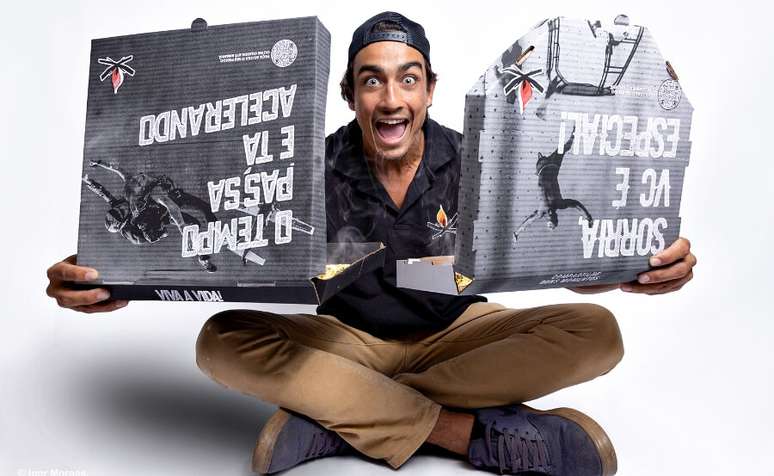Hooking the sharks on “Shark Tank Brasil”: the entrepreneur multiplies business and exceeds R$ 10 million in 2023
The initial investment of R$3,000, much lower than the standards of those who wanted to ride the food truck wave in 2015, resulted in a million dollar business for Gabriel Farrel, CEO and founder of Borda and Lenha.
Astute and eager to earn his own source of income, the young man, then twenty-one years old, dropped out of environmental engineering, built a wood-fired oven in the back of the academy professor’s truck and designed a pallet structure to sell pizzas on the street . events in Rio de Janeiro.
The speed of delivery, the customization of the products, the accessible price and the scent of ready pasta won over not only the locals, but also José Semenzato and Felipe Titto during a broadcast on “Shark Tank Brasil”, in 2021.
How to seduce sharks
To seduce the sharks, Gabriel captured them using a strategy that works well. He let the investors choose the flavors of the pizzas and, at the end of the presentation and at the beginning of the round of questions, he delivered the hot product. In less than five minutes he has transformed the tense blue ocean into a pleasant pizzeria where good deals can be made.
From then on, Borda e Lenha, which until then had four units, three franchised and one company-owned, jumped to 26 deals and another 28 already negotiated, for a total of 54 as of September this year.
The leap, of 650% in the number of stores opened and 1,350% in those sold, was not limited to the streets of the wonderful city and has conquered Brazil, from North to South, already being present in nine states. Likewise, revenues, amounting to R$1.2 million in 2021, have not been left behind and this year are expected to exceed the initial projection, which was R$10 million.
A restless story
To swim in this ocean, Gabriel Farrel needed a lot of energy. Eager to have his own savings, as a teenager he did odd jobs to save money.
But it was in college, when the distance between where I lived and the institution where I studied made time more scarce, that impatience gave way to a sharper eye for entrepreneurship. At the height of food trucks taking over the squares and streets of Sao Paulo and Rio de Janeiro, the young man saw an opportunity.
He contributed the few resources he had, installed a stainless steel wood-fired oven in the academy professor’s vehicle, prepared 100 pizza discs and went to participate in the fair. The smell of pre-cooked dough soon became a trademark, attracting consumers not only for its smell, but also for its affordable price, flavor and speed of preparation, as the pizza was ready in just three minutes , in addition to the speed of delivery. .
Attentive to market movements, Gabriel migrated and adapted the business model to the opportunities that arose. He attended private parties while simultaneously being on the street. He rented a house to take care of the preparations before each event and, in 2018, he imagined a new format.
With the support of an investor, it opened the first physical, self-service style unit of ingredients: the customer chooses what to put in the dough and the employee finishes cooking it. The idea was brilliant and the business prospered, but given the difference in management between the partners, the partnership soon disintegrated, leaving Gabriel with the name he had created three years earlier. Undeterred, he invested in delivery, transforming the pizzeria into a model of dark cuisine in 2019.
In a 32m² space in Botafogo, Borda and Lenha it was a success. Monthly revenue, which started with R$35 thousand, reached R$150 thousand per month, reaching 140 orders per day. With promotions that stimulated consumption, the pizzeria attracted attention and, organically, attracted franchisees. Gabriel, a curious young man since adolescence, had already worked in a franchisor at this time and had acquired the knowledge to structure the franchising business.
Like swimming with sharks
In the same year, 2019, he sold two units, reaching the neighborhoods of Tijuca and Barra da Tijuca. The pace of growth, which seemed linear even in 2020, when delivery stood out from other businesses during the pandemic, suffered a setback in 2021 for a single reason: the founder’s constant insistence on participating in “Shark Tank “.
In his fourth year of registration, he was selected to participate in the program. In the ocean of possibilities, he stood out in front of the judges and accepted José Semenzato’s proposal. In January 2022, the entrepreneur owner of the SMZTO holding and his friend Felipe Titto acquired 50% of Borda e Lenha and set a new pace of expansion, taking the pizzeria to another level.
In the first year of the partnership, 24 operations were marketed, of which 10 were open, and R$ 2.6 million were invoiced. Now, in 2023, with 26 units operating in nine states, the plan is to open 30 stores by the end of the year and another 150 within 3 years.
Maintaining the essence of “build your own pizza”, accessible price, unique flavor and speed of preparation, the goal is to popularize one of the dishes most loved by Brazilians and also make the dream of entrepreneurship achievable for those, like Gabriel , wants to own his own business.
inspires transformation in the world of work, in business, in society. Compasso, a content and connection agency, is born.
Source: Terra
Rose James is a Gossipify movie and series reviewer known for her in-depth analysis and unique perspective on the latest releases. With a background in film studies, she provides engaging and informative reviews, and keeps readers up to date with industry trends and emerging talents.







